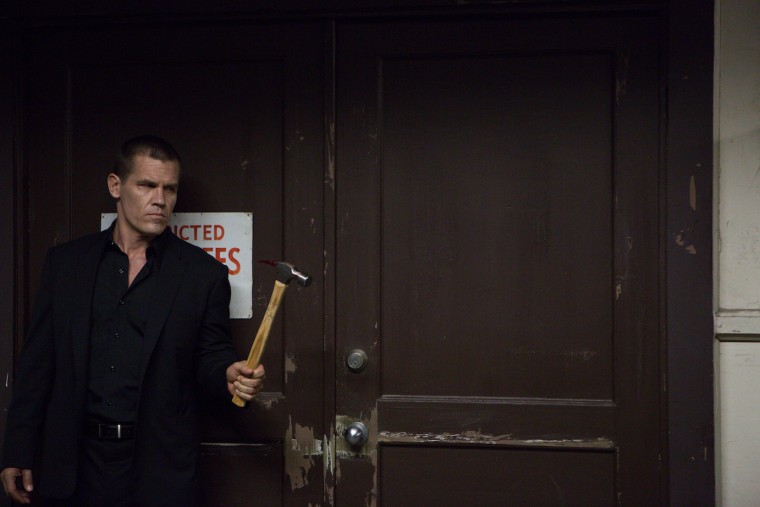Spoiler alert: This article contains details about the plot of "Oldboy."
For screenwriter Mark Protosevich, reimagining the mind-bending “Oldboy” story with its horrifying twist was a daunting task. The material already was well-known in Asia, where it developed from a series of Japanese graphic novels and was also a Korean film cult classic.

Protosevich (“I am Legend” and “The Cell”) spent months reviewing the original movie, pouring over the manga, and studying other films with twist endings like “Vertigo” and “Point Blank” to arrive at his visceral rendition, which opens Wednesday.
The journey began five years ago when actor Will Smith, whom he worked with on “I am Legend,” approached Protosevich about writing the script. A version of the film starring Smith never took off, but Protosevich felt so emotionally invested, he wrote three more drafts until Spike Lee signed on to direct it in July 2011.
“When you’re starting out doing any kind of adaptation, what you want to do is absorb as much of the source material as you possibly can,” Protosevich told TODAY. “But then you have to get to a point where you start writing and developing the story and you almost have to put blinders on and feel, in a creative sense, that you’re telling the story for the first time. I’m trying to create something that feels new, even though it’s based on other source material.”
In Lee’s “Oldboy,” Josh Brolin plays Joe Doucett, an alcoholic ad executive and neglectful father who is imprisoned in a tiny mysterious room where he is served dumplings through a doggie door and watches a lot of television for 20 years for no apparent reason. While in captivity, Joe discovers he has been framed for his wife’s murder and that his young daughter was abducted. When he is mysteriously freed, he sets out on a bloody vendetta only to learn his captors are still in control.
“I love the original film,” Protosevich said. “It’s a very unique vision and powerful visually and also very stylized in its storytelling. I adore and think it’s a very unique work of art. But one of my goals was to ground our version more in reality.”
To that end, Protosevich’s script is more of a character study than the original. A lot of time is spent on Joe’s psychological journey and transformation, which Park Chan Wook’s 2003 movie doesn’t address. Protosevich said he was influenced by the manga’s depiction of Joe’s conversion into a wild animal, which is why the film devotes a lot of time to Brolin’s character alone in his room.
“The graphic novels are very different from the Korean film,” Protosevich said. “It builds to a very different conclusion and revelation about the villain’s motives.”
Although Protosevich preserved the Korean film’s twist, his protagonist makes a starkly different choice in what he does with the information. In the villain’s disturbing mind game, he is avenging the death of his sister, in which his captive played a tangential, if unknowing, part.
In the story Protosevich created, Adrian the villain (Sharlto Copley of “District 9”) arranges it so that Joe meets a young social worker Marie (Elizabeth Olson) who helps to take care of him and eventually falls in love with him. The original movie has a similar scenario involving the young chef who comes to the protagonist’s aid when he faints, and their relationship develops quickly after he tries to sexually assault her.
“I wanted to approach the female character in our version as a character that is more grounded in a reality familiar to the people seeing our film,” Protosevich said. “I like and admire strong and professional women. I like and admire people whose work is about helping others. I wanted her to be a character that people recognized and feel empathy for. I loved the actress in the original film but I don’t think that’s the type of character that would resonate well especially with women in a Western audience.”
(Big spoilers coming.)
In the Korean film, the villain eventually reveals that the young woman is the long-lost daughter of the protagonist who later undergoes hypnosis to remove that knowledge from his brain so that he can continue to be with her in a romantic relationship. Protosevich didn’t think that would work with American audiences. Instead, Joe sets Marie free by checking back into the hotel where he was held for two decades, thus voluntarily putting himself back in prison for life.
“I tried to put myself into the psyche of the character at the moment where you find out that the woman you’ve been with is your daughter,” he said. “I personally am not going to figure out a way that I can stay with her. In our film, he feels so horrified by what he’s learned. Part of the goal was not just a revenge story but also his redemption as a human being. I wanted him to reach a point where he could do something to help her and also to break all contact with her. And that’s the primary reason he isolates himself at the end of the movie.”